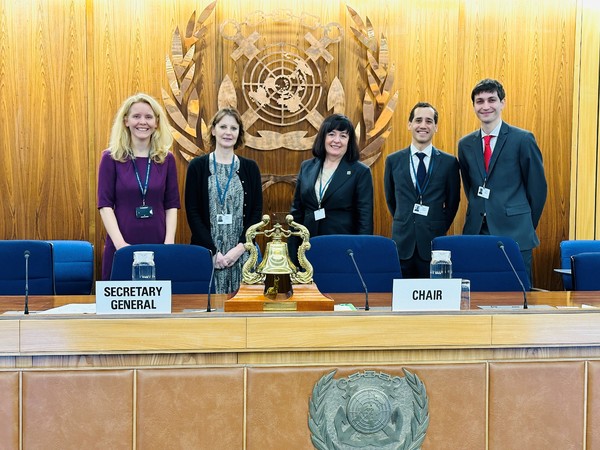The Marine Environment Protection Committee (MEPC) addresses environmental issues under the IMO’s remit, particularly greenhouse gas emissions from ships. The 81st session of the Committee (MEPC 81) met from 18 to 22 March 2024 at the IMO in London and was chaired by Dr Harry Conway from Liberia.
During MEPC, IUMI facilitated a presentation by the Poseidon Principles for Marine Insurance (PPMI) of which IUMI is a supporting partner to provide the IMO audience with a better understanding of this initiative which aims to measure and report carbon emissions of its signatories’ Hull & Machinery portfolios.
Tackling climate change
IMO has developed global regulations on energy efficiency for ships. MEPC 80 in July 2023 adopted the 2023 IMO Strategy on Reduction of GHG Emissions from Ships, with the goal of achieving net-zero GHG emissions by or around, i.e. close to, 2050. MEPC 81 agreed on an illustration of a possible draft outline of an “IMO net-zero framework” for cutting greenhouse gas emissions (GHG) from international shipping. The draft outline of this framework lists MARPOL regulations which will be adopted or amended to allow for a new global fuel standard and a new global pricing mechanism for maritime GHG emissions:
- a goal-based marine fuel standard regulating the phased reduction of the marine fuel’s GHG intensity; and
- an economic mechanism(s) to incentivize the transition to net-zero.
MEPC also adopted revised Guidelines on life cycle GHG intensity of marine fuels (LCA Guidelines). The updated guidelines include revised calculations for default emission factors; updated well-to-tank default emission factor submission; and new Tank-to-Wake (TtW) emission factors.
Further, two correspondence groups have been established which will report to MEPC 83. The first group is tasked to develop a work plan on the development of a regulatory framework for the use of onboard carbon capture systems and to look into Tank-to-Wake methane and nitrous oxide emissions; the second group will look into social and economic sustainability themes and aspects of marine fuels for possible inclusion in the LCA Guidelines.
Energy Efficiency
MEPC approved the report on the fuel oil consumption data submitted to the IMO Ship Fuel Oil Consumption Database (reporting year: 2022). Data was reported by almost 29,000 ships, an increase of over 800 ships compared to 2021. These ships reported the use of 213 million tonnes of fuel, which is just slightly higher than in 2021 (212 million tonnes in 2021).
The report on annual carbon intensity and efficiency of the existing fleet (reporting years: 2019, 2020, 2021 and 2022) was noted. It provides information on progress towards the at least 40% carbon intensity improvement target to be achieved by 2030, on the basis of both demand-based and supply-based measurement metrics.
Tackling marine litter
Mandatory reporting of lost containers
MEPC adopted amendments to MARPOL, referencing a procedure for reporting lost freight containers. Containers lost overboard can be a serious hazard to navigation, safety at sea and the marine environment.
The amendments to the MARPOL Convention (Provisions concerning reports on incidents involving harmful substances) would add a new paragraph to say that "In case of the loss of freight container(s), the report required by article II (1) (b) shall be made in accordance with the provisions of SOLAS regulations V/31 and V/32." The amendments are expected to enter into force on 1 January 2026. Related draft SOLAS amendments are to be adopted by the Maritime Safety Committee (MSC 108) and will require the master of every ship involved in the loss of freight container(s) to communicate the particulars of such an incident to ships in the vicinity, to the nearest coastal State and to the flag State.
Recommendations for the carriage of plastic pellets by sea in freight containers
MEPC approved Recommendations for the carriage of plastic pellets by sea in freight containers, agreed by the Sub-Committee on Pollution Prevention and Response (PPR 11). The recommendations address packaging; transport information; and stowage of plastic pellets.
Implementation of the Hong Kong Convention
MEPC approved reporting formats and the future development of a GISIS module, to provide electronic reporting facilities, to assist with implementation of the Hong Kong International Convention for the Safe and Environmentally Sound Recycling of Ships (Hong Kong Convention), which is set to enter into force on 26 June 2025. The Convention is aimed at ensuring that ships, when being recycled after reaching the end of their operational life, do not pose any unnecessary risks to human health, safety and to the environment.
MEPC discussed a potential overlap in requirements between the Hong Kong Convention and the Basel Convention on the Control of Transboundary Movements of Hazardous Wastes and their Disposal. MEPC requested the Secretariat to continue and strengthen the cooperation with the Secretariat of the Basel Convention to cater for any information and assistance needed to ensure clear and robust implementation of the Hong Kong Convention; and to report the outcome of MEPC 81 to the COP to the Basel Convention. MEPC invited interested Member States to bring the issue to the attention of relevant meetings under the Basel Convention and to submit further proposals to MEPC 82 on the interplay between the Hong Kong and Basel Conventions regarding ship recycling. The IMO Secretariat was requested to develop draft guidance on this matter, in consultation with the Basel Convention Secretariat.
